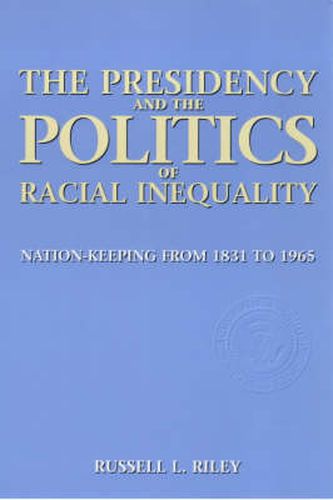Readings Newsletter
Become a Readings Member to make your shopping experience even easier.
Sign in or sign up for free!
You’re not far away from qualifying for FREE standard shipping within Australia
You’ve qualified for FREE standard shipping within Australia
The cart is loading…






From the abolition of slavery to the civil rights movement one hundred years later, one of the primary characteristics of America’s development as a nation has been the steady struggle for and expansion of the horizons of citizenship. Pivotal in any equal rights movement is the response of the White House: how the president addresses any such movement profoundly affects its chances for success. Russell L. Riley examines the logic of presidential behavior with regard to equality movements. Focusing on the most explosive and enduring of such movements–the struggle for social and economic parity by African Americans–Riley argues that the president’s unwritten mandate as the designated protector of domestic social order is to suppress or moderate major social change. Consequently, only in extreme circumstances have presidents become advocates of serious reform. The Presidency and the Politics of Racial Inequality goes beyond the triad of Lincoln, Kennedy, and Johnson with discussions of F.D.R., Truman, and Eisenhower to see how these presidents dealt with situations that forced them into the fray. Riley questions the positive role played by some presidents–and contends that their failure to suppress racial unrest has not been adequately discussed.As Riley convincingly demonstrates, American political culture made it unlikely that any president would invest executive power in a deeply controversial enterprise. His study goes far toward explaining why significant change has been slow to take hold, even in one of the most open democratic systems in the world.
$9.00 standard shipping within Australia
FREE standard shipping within Australia for orders over $100.00
Express & International shipping calculated at checkout
From the abolition of slavery to the civil rights movement one hundred years later, one of the primary characteristics of America’s development as a nation has been the steady struggle for and expansion of the horizons of citizenship. Pivotal in any equal rights movement is the response of the White House: how the president addresses any such movement profoundly affects its chances for success. Russell L. Riley examines the logic of presidential behavior with regard to equality movements. Focusing on the most explosive and enduring of such movements–the struggle for social and economic parity by African Americans–Riley argues that the president’s unwritten mandate as the designated protector of domestic social order is to suppress or moderate major social change. Consequently, only in extreme circumstances have presidents become advocates of serious reform. The Presidency and the Politics of Racial Inequality goes beyond the triad of Lincoln, Kennedy, and Johnson with discussions of F.D.R., Truman, and Eisenhower to see how these presidents dealt with situations that forced them into the fray. Riley questions the positive role played by some presidents–and contends that their failure to suppress racial unrest has not been adequately discussed.As Riley convincingly demonstrates, American political culture made it unlikely that any president would invest executive power in a deeply controversial enterprise. His study goes far toward explaining why significant change has been slow to take hold, even in one of the most open democratic systems in the world.